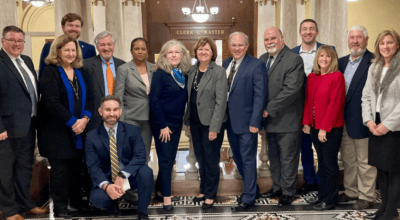

The case Flexibility Capital vs. Tulis is being appealed to the Tennessee court of appeals on grounds that Hamilton County circuit court judge Kyle Hedrick has no subject matter jurisdiction to hear pleadings to enforce of an illegal, criminal contract in Tennessee. The plaintiff is a loan shark, Flexibility Capital, which pretends it is an purchaser of future receivables. In fact, it is a lender subject to Tennessee interest rate limits. This analysis argues (on the presumption that Flexibility is a legal business lender) the first 10 pages of the contract absolve repayment during economic disaster.. The last 3 pages, the personal guarantee, convert the advance purchase of future receivables into a contract for a loan.
Affidavit and amended answer to motion for summary judgment
Comes now David Jonathan Tulis, the accused, in the alternative, to state facts to the best of his knowledge and ability, under oath, and to move the court for relief, as follows:
- This dispute over payment of a debt arises because of unlawful interference of the agreement by third parties — namely public servants in elected and appointed office.
- The advance on future receivables of $18,905 was deposited by wire as of Feb. 6, 2020, to the credit union account of Hot News Talk Radio LLC. Automatic payments began the next day to Flexibility Capital at the rate of $176 per weekday.
- The record indicates Hot News Talk Radio LLC began having trouble paying March 5, 2020, with a $35 fee imposed for insufficient funds. The last payment was March 10. The record shows the last of three $100 fees for failed payments was “applied” March 12 against the borrowers’ account. Hot News Talk Radio was in collapse that day.
Contract interference by 3rd parties

- March 12 was an important day in Tennessee. Gov. Bill Lee imposed a state of emergency under Tenn. Code Ann. § Title 58 over SARS-CoV-2, or Covid-19, flu symptoms said by the World Health Organization to be in the nature of a global pandemic. A government- and media-caused panic collapsed the Tennessee economy and put tens of thousands of people out of work and shuttered thousands of businesses. EXHIBIT No. 1, Executive Order No. 14, March 12, 2020, “Suspending provisions of certain statutes and rules”
- The situation worsened on April 2, 2020. The governor imposed a “safer at home” emergency declaration that put the state’s inhabitants under effective house arrest in what is today called a “lockdown,” a measure long used in Tennessee prisons in time of riot, affray and breaches of the peace. Gov. Lee effectively imposed martial law on the state’s inhabitants. EXHIBIT no. 2, Executive Order No. 23, “Stay at home”
- In Hamilton County, the shutdown of the economy was secured by threats upon the public by officials such as Chattanooga police chief David Roddy and deputies of Sheriff Jim Hammond. The county secured the economic shutdown by two erstwhile directives, which inhibited members of the public from conducting business. Directive No. 1 was July 10, 2020, and No. 2 was effective Sept. 8, 2020. EXHIBITS No. 3, and No. 4.
- City of Chattanooga, among other municipal governments, acted to prevent the transaction of business. Mayor Andy Berke issued numerous executive orders such as E.O. 2020-02, March 19, 2020, declaring an emergency, EXHIBIT No. 5, and E.O. 2020-04, “regarding additional safety precautions and business restrictions,” March 23, 2020, EXHIBIT No. 6.
- Government intimidation went beyond mere words. The county sued Ed’s Supply over its refusal to obey the purported “mask mandate” Aug. 28, 2020. EXHIBIT no. 7, “Petition for the enforcement of a health directive,” 1 p.
- On Dec. 21, 2020, Gov. Lee issued EO No. 70, continuing the emergency and saying “Tennesseans should work from home where possible,” continuing the economic depression. EXHIBIT No. 8 “Limiting gatherings and spectator events and urging working from home.”
- On Jan. 16, 2021, the county issued Directive No. 5 commanding people to wear chin diapers outdoors and in, with exceptions. EXHIBIT No. 9.
- The shutting down of the state economy by penal means destroyed business and confidence among owners. For affiant, it was impossible to generate sales, pay rent and to maintain accounts among small business owners — its chief advertising customer base.
- Accused endured the state of emergency, with harm done against his rights in five ways, chiefly his right to make a living and pursue an occupation.
- Actions in violation of state law by Gov. Bill Lee and health department administrator Becky Barnes of the Hamilton County health department interfered with the free market economy statewide and in local economy, molesting the contract between the parties. Accused delineates five harms in an affidavit that is part of a Hamilton County chancery court petition in equity and for writ of mandamus against Mr. Lee and Mrs. Barnes. The exhibit in State ex rel David Tulis v. Bill Lee, governor, et al, case No. E2021-00436-COA-R3-CV, certifies his standing to sue as he has an interest in public servants’ obedience to state law. It also establishes the extent of harms imposed upon him personally by these interfering third parties as against the contract. EXHIBIT No. 10, “Affidavit of David Jonathan Tulis in evidence for the petition in equity and for writ of mandamus”
- Respondents in State ex rel Tulis violated state law at Tenn. Code Ann. § 68-5-104, the communicable disease law that requires respondents to determine the diagnosis, source or cause of an epidemic in Hamilton County in the interest of public health. The governor imposed his Title 58 state of emergency without warrant, without lawful or legal cause or reason and without a nonfraudulent exigency. Martial law is absolutely forbidden in Tenn. Const. Art. 1 sect. 25, as “inconsistent with the principles of free government.” Any breach by an official that escapes notice under the Tennessee bill of rights is forbidden in a catchall provision in Tenn. Const. Art. 1, sect. 16, that states,
The declaration of rights hereto prefixed is declared to be a part of the Constitution of the state, and shall never be violated on any pretense whatever. And to guard against transgression of the high powers we have delegated, we declare that everything in the bill of rights contained, is excepted out of the general powers of the government, and shall forever remain inviolate. [emphasis added]
The respondents have admitted acts of felony official misconduct in legal proceedings in Hamilton County chancery court. They have argued they are not under “any duty” to obey the law (Lee, italics in original) or were exercising “discretion” in disobeying it (Barnes).
- Relator is petitioning for a hearing in the supreme court after a negative ruling May 23, 2022, case No. E2021-00436-SC-R11-CV.
Contract: Flexibility accepts failure risk
- Accused refused to participate in the federal government’s paycheck protection program for reasons of honor and integrity, unwilling to put his financial distress upon other members of the public.
- He has demanded if Flexibility Capital took free money from the federal government to reimburse it for shortfalls from Hot News Talk Radio. The Cheadle business received $122,278 in April 2020 from Pinnacle Bank for 9 jobs covered by the federal paycheck protection program.
https://www.federalpay.org/paycheck-protection-program/john-cheadle-jr-dba-cheadle-law-nashville-tn
- Hot News Talk Radio as of June 2022 is dissolved for not being in good standing.
- The owners attempted to negotiate with Flexibility Capital, but found its operators anything but flexible.
- Flexibility Capital’s lawsuit against ostensible personal guarantors appears based on the belief that nonpayment is caused by bad faith, rather than by lack of means in accused’s good-faith operation of his radio business. Flexibility Capital wants to be paid now, no matter what.
- The contract recognizes business rises and falls, and that it is possible the business may fail and generate no future receipts. The contract, at 14.a.ii,, p. 3, under “Risk sharing acknowledgements and arrangements,” states,
The period of time that it will take Flexibility to collect the purchased amount is not fixed, is unknown to both parties as of the effective date of this agreement and will depend on how well or not well merchant’s business will be performing following the effective date. As an extreme example, in the event merchant’s business ceases to exist after Flexibility’s purchase of the purchased future receipts for reason outside merchant’s control, Flexibility may never recover any moneys spent on such purchase.
- Flexibility by contract assumes risk involved with accuseds’ business.
[O]r if the full purchased amount is not remitted because the merchant’s businesswent bankrupt or otherwise ceased operations in the ordinary course of business (but not due to Merchant’s wilful or negligent mishandling of its business), and merchant shall not have breached this agreement, merchant would not owe anything to Flexibility and would not be in breach of or in default under this agreement.
P. 4, 14(a)(v)
Flexibility agrees to purchase the purchased future receipts knowing the risk that merchant’s business may slow down or fail, and Flexibility assumes these risks based exclusively upon the information provided to it by merchant ***.
P. 4, 14(b)
Furthermore, Flexibility hereby acknowledges and agrees that merchant shall be excused from performing its obligations under this agreement in the event merchant’s business ceases its operations exclusively due to the following reasons (collectively, the “valid excuses”). (i) [A]dverse business conditions that occurred for reasons outside merchant’s control and not due to merchant’s willful or negligent mishandling of its business. *** [N]atural disasters or similar occurrences beyond merchant’s control.
P. 4, 14(b)
- The agreement is “not a loan,” and “the purchase price is paid to merchant in consideration for the ownership of the purchased future receipts and that payment of the purchase price by Flexibility is not intended to be, or shall it be construed as a loan *** that requires absolute and unconditional repayment on a maturity date.”
To the contrary, Flexibility’s ability to receive the purchased amount *** and the date when the purchased amount is paid in full (if ever) are subject to and conditioned upon performance of merchant’s business *** [emphasis added]
14(c)
- Lex non cogit impossibilia. The law requires nothing impossible. Co. Litt. 231, b; 1 Bouv. Inst. n. 951. No law, no order or summary judgment from the court ordering accused men to pay to cover an alleged debt has power to bring satisfaction to the plaintiff, given third-party interference with the contract.
- Flexibility Capital extended credit to Hot News Talk Radio LLC knowing that it risked not getting paid. But it took that risk; too, the borrower took the risk of the obligation, intending to fulfill the terms, its owners and managers operating in good faith.
- Illicit acts by third parties are the proximate cause of the breach between the parties, and did violence to the service of this contract. The accused pleads for relief and protection of the honorable court. He demands the court dismiss the motion for summary judgment and look favorably upon this affidavit and pleading.
Further affiant sayeth naught.

